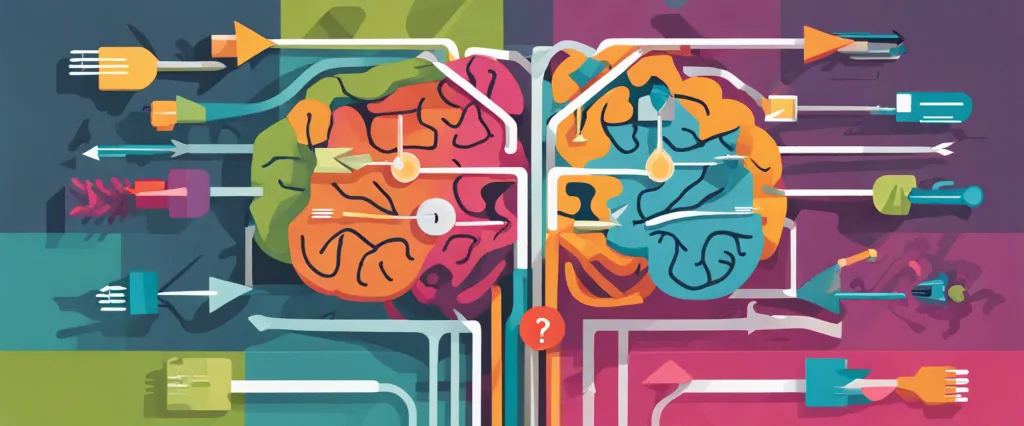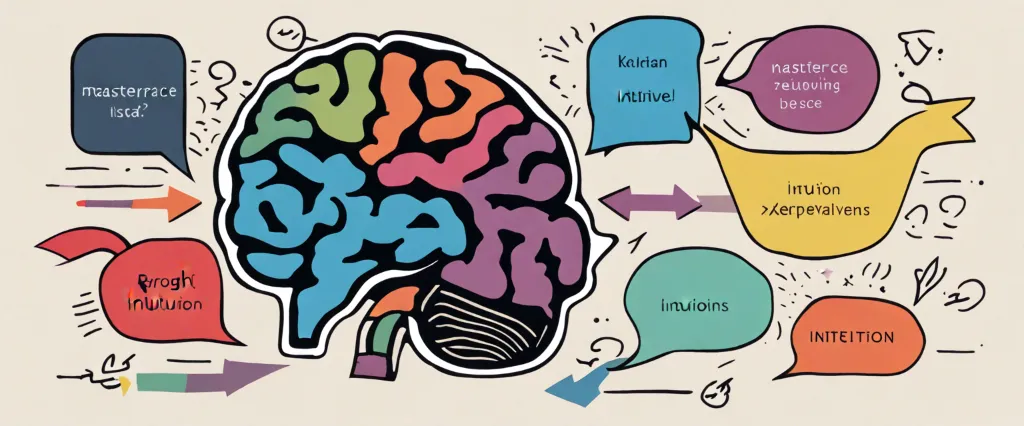“How the Mind Works” by Steven Pinker is a thought-provoking exploration of the human mind, aiming to uncover its inner workings and dispel common misconceptions about human nature. Pinker, a cognitive scientist, presents a comprehensive view of the mind by integrating various fields such as psychology, biology, philosophy, and computer science.
Pinker begins by challenging the concept of the mind as a blank slate or tabula rasa, arguing instead that the mind is a product of evolution shaped by natural selection. He delves into the evolutionary origins of various mental processes, such as perception, emotion, memory, language, and reasoning. Pinker explains that these mental faculties are not inexplicable mysteries, but rather adaptations honed by millions of years of evolution.
The book delves into topics like the nature vs. nurture debate, providing evidence that genes play a crucial role in shaping human behavior and mental processes, while acknowledging the significant influence of environmental factors. Pinker explores the concept of consciousness and argues that it emerges from the interaction of different modules in the brain rather than being a single unified entity.
Pinker also tackles controversial topics concerning human nature, such as gender differences, violence, and the moral sense. He presents arguments supported by scientific research to counter widely held misconceptions, aiming to provide a clearer understanding of these complex issues.
Throughout the book, Pinker utilizes clear and engaging writing, often using examples and anecdotes to help readers grasp the complexities of the mind. He also explores the practical implications of understanding the mind’s workings, such as its impact on education, parenting, and artificial intelligence.
In conclusion, “How the Mind Works” is a thought-provoking journey into the inner workings of the human mind. Steven Pinker presents a compelling argument that the mind is a result of evolution, highlighting its various facets and demonstrating how understanding our mental processes can lead to a better understanding of human nature and our place in the world.
Personality Isn’t Permanent by Benjamin Hardy challenges the traditional belief that our personalities are fixed and unchangeable. By drawing on evidence from psychology, neuroscience, and his personal experiences, Hardy argues that we can shape and transform our personalities to become the individuals we truly want to be.
The book begins with an exploration of the concept of personality and how it has been misunderstood and misinterpreted throughout history. Hardy highlights the flaws of various personality tests and theories, emphasizing the limitations of trying to categorize individuals based on fixed traits.
Hardy then introduces the concept of identity and presents the idea that our identities are fluid and adaptable. He emphasizes the importance of purposeful, intentional growth and introduces various strategies and techniques to help readers redefine their sense of self.
One key aspect of the book is the concept of future self. Hardy suggests that rather than focusing on our past or current selves, we should envision and work towards becoming the person we want to be in the future. By setting clear goals, creating a vision, and taking action steps towards our desired identities, we can actively shape our personalities.
Moreover, Hardy provides insights on various practices and habits that can aid in personal transformation. He emphasizes the importance of embracing discomfort, learning from failures and setbacks, setting effective goals, developing a growth mindset, and building habits that align with our desired identities.
Throughout the book, Hardy explores real-life examples of individuals who have successfully transformed their personalities to demonstrate the possibilities of personal growth and change. He also addresses common doubts and objections that individuals may have regarding their ability to change, providing practical advice and resources to help readers overcome these obstacles.
In conclusion, Personality Isn’t Permanent challenges the traditional notion that personality is fixed and offers a new perspective on personal growth and transformation. By presenting evidence-based strategies and practical advice, Benjamin Hardy aims to empower readers to take control of their own identities and create fulfilling, intentional lives.
Comparison between Two Books
In both “How the Mind Works” by Steven Pinker and “Personality Isn’t Permanent” by Benjamin Hardy, the concept of knowing oneself is emphasized. Although the books approach the topic from different perspectives, they share common ground in their exploration of self-awareness and the importance of understanding one’s own mind.
1. Self-reflection and introspection: Both books encourage readers to engage in self-reflection and introspection as a means of understanding oneself better. Pinker suggests that by examining our thoughts, emotions, and motivations, we can gain insight into why we behave the way we do. Hardy, on the other hand, advocates for the practice of self-observation to identify patterns of behavior and thought that may hinder personal growth.
2. Overcoming biases and illusions: Pinker and Hardy highlight the presence of cognitive biases and self-deception that can cloud our understanding of ourselves. Pinker argues that our minds often create illusions that generate false perceptions of reality, and by recognizing and challenging these illusions, we can gain a more accurate understanding of ourselves. Similarly, Hardy discusses the importance of questioning and challenging our existing beliefs and narratives to overcome self-limiting patterns.
3. Neuroscience and personal development: Both books integrate neuroscience into their exploration of self-awareness. Pinker delves into the science behind how our minds process information, perceive reality, and form beliefs, while Hardy draws on neuroscience to explain the malleability of our personalities and the potential for personal growth and change. By understanding the mechanisms underlying our thoughts and behaviors, readers can develop a clearer understanding of themselves.
4. Continuous self-improvement: Both authors advocate for continuous self-improvement as a means of knowing oneself better. Pinker argues that understanding our cognitive biases and limitations can aid in personal growth and decision-making. Hardy emphasizes the importance of actively working towards self-improvement and intentionally shaping our personalities rather than accepting them as fixed entities. Both books suggest that active engagement and effort are necessary for personal growth and self-awareness.
Overall, while “How the Mind Works” and “Personality Isn’t Permanent” differ in context and approach, they converge in highlighting the significance of knowing oneself. Both books encourage readers to engage in introspection, challenge their biases, utilize neuroscience to understand their minds, and pursue continuous self-improvement as a path towards greater self-awareness.
“How the Mind Works” by Steven Pinker and “Personality Isn’t Permanent” by Benjamin Hardy are two books that explore different aspects of the human mind and personality. While they both touch upon the topic of self-awareness and personal growth, their approaches and perspectives diverge in certain ways.
In “How the Mind Works,” Pinker delves into the evolutionary origins of the human mind and seeks to uncover the underlying mechanisms that shape human behavior, thoughts, and emotions. He argues that through a thorough understanding of evolutionary psychology, cognitive science, and neuroscience, we can gain insights into why our minds work the way they do. Pinker emphasizes the importance of recognizing the innate nature of our cognitive processes and evolutionary predispositions in order to better understand ourselves.
On the other hand, “Personality Isn’t Permanent” by Benjamin Hardy challenges the common belief that personality is fixed and unchangeable. Hardy emphasizes the idea that individuals have the power to shape and transform their personalities through intentional personal development and growth. He argues that people often limit themselves by adopting a fixed mindset about their personality traits, instead of recognizing that they have the ability to redefine who they are based on intentional choices and actions.
The divergence between the two books lies in their perspectives on self-knowledge. Pinker’s “How the Mind Works” suggests that self-awareness is attained by understanding our evolutionary heritage and the inherent qualities that shape human cognition. He focuses on understanding the mind from a scientific and objective standpoint.
In contrast, Hardy’s “Personality Isn’t Permanent” promotes a more subjective view of self-awareness, advocating for intentional personal development and growth to redefine and shape our personalities. He encourages readers to reflect on their values, goals, and aspirations, and make deliberate choices that align with their desired identity.
While Pinker’s approach emphasizes understanding ourselves through scientific knowledge, Hardy’s perspective revolves around actively creating ourselves and proactively working towards personal transformation.
In conclusion, the divergence between these two books lies in their approaches to self-knowledge. “How the Mind Works” focuses on understanding our innate cognitive processes from an evolutionary standpoint, while “Personality Isn’t Permanent” encourages intentional personal growth and transformation to redefine ourselves. Both perspectives contribute to the exploration of knowing oneself, but through different lenses.




